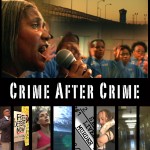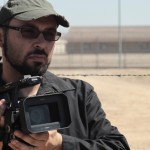Press
Both Debbie Peagler’s legal saga and the film CRIME AFTER CRIME have been featured in a wide range of news stories on television, radio, print, and the internet. This coverage has raised the media profile for victims of domestic violence and wrongful incarceration, helping to shape the response to these issues in the years to come.Visit msnbc.com for breaking news, world news, and news about the economy
 Click HERE to view excerpts of PAST MEDIA COVERAGE.
Click HERE to view excerpts of PAST MEDIA COVERAGE.
 Click HERE to access our PRESS KIT.
Click HERE to access our PRESS KIT.
 Four Questions with filmmaker Yoav Potash
Four Questions with filmmaker Yoav Potash
By Sundance Documentary Fund staff
After The Sundance Documentary Fund selected CRIME AFTER CRIME as one of a select few projects chosen from nearly 1,000 films applying for funding, Sundance staff asked filmmaker Yoav Potash a few questions about his work, his hopes for the film, and his advice for would-be filmmakers…
1. What is it about film that you are the most passionate about? In other words, why film and why documentary?
What attracted me to film originally is that it is an art form where you get to dabble in a wide variety of creative disciplines – music, photography, writing, and many other forms of artistic expression all have a place in filmmaking. From there I stumbled into making documentaries simply because it required far less capital to get started than narrative filmmaking. But the more I practiced the craft of documentaries, the more I became drawn in by the power of real stories and the challenge of trying to have your camera there for the most significant moments. When you get it right, documentaries can help lead to greater understanding, shifts in attitudes, and social and political change – and that prospect, as idealistic and indefinite as it may be, appeals to my desire to do some good in the world.
2. When did you decide to make Crime After Crime?
After I met Debbie Peagler face to face inside the prison and she had the chance to fully tell me her story, I was hooked. Here was a woman who had been horribly abused for years, then incarcerated for decades, and yet she still had a positive attitude about life despite all of the injustices she had endured. The fact that she led the gospel choir inside the prison, that she taught other women to read and write, and that she seemed to inspire everyone around her, including the two young lawyers who had volunteered to try to win her freedom – all of this motivated me to want to follow her case and to track down witnesses and experts who could speak about what had happened to her. Over time, I saw how there were other women whose story fit the same basic pattern as Debbie’s, and this made me realize that Debbie’s story was not only a dramatic saga in its own right, but that it also represented an entire cause and an entire class of people who have largely been forgotten and ostracized.
3. Who do you hope your film will reach when it’s complete? What kind of impact do you hope to have? It’s easy to keep going when things are going well. What keeps you going when things are difficult?
I hope that Crime After Crime will focus national attention on the intersection between domestic violence and our criminal justice system. At present, California is the only state that allows incarcerated survivors of domestic violence to petition courts for their freedom based on previously unheard evidence of abuse they endured. It is time for other states to consider passing similar laws and for them to take significant steps to address domestic violence and wrongful incarceration.
When things are difficult, what keeps me going is a sense that I will complete this film in the best way that I can no matter if outside factors are encouraging or discouraging me. It might sound cheesy, but I really feel this sense in my heart. There have been a couple of times where I began making a film without finding that sense of personal commitment and bonding with the subject, and sure enough, those have been the projects that I eventually shelved and never completed. But if a film or any work of art is going to take some amount of years, I think that the artist has to find a place in his or her heart that cannot be moved, that will pursue the vision relentlessly. It’s that feeling that you hold tight to when you find out that you didn’t get that grant that you wanted or that shot that you wanted, and it’s that same feeling that sparks a passion in people who work with you and who get energized about the work along with you.
In the case of Crime After Crime, the core of this commitment had to do with the fate of my main character as an incarcerated woman who arguably deserved to be free, and what her case and her story could mean for thousands of others who facing similar circumstances. When you look at it that way, even when you encounter obstacles you don’t think, “How can I go on telling this story?” It’s more like, “How could I not go on telling this story?”
4. If you had/have a kid that told you he or she wanted to be a filmmaker, what would you tell them?
I tell anyone who wants to be a filmmaker to jump in and make something short. Making short films gives you a chance to practice shooting, editing and all of the other skills you will need to make a longer film, but hopefully without the multi-year commitment that most full-length films demand. A short film allows you to do your best, make some mistakes, learn, and then move on to make an even better film the next time. These days, you have YouTube and thousands of film festivals, so people actually have the chance to see and respond to short films. At that stage it’s important to listen to feedback from people who can be honest with you about what you’ve done well and what you haven’t. By making short films you will either get hooked on filmmaking or you will realize that it’s not for you and that just because you love watching films doesn’t necessarily mean you love making them. Finally, I would encourage people to always keep in mind that the story is the most important thing. It seems obvious, but it’s something that easily gets lost in the shuffle when film people start geeking out about everything from film theory to the latest, greatest camera or editing software.
